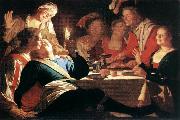Wholesale Oil Painting No Minimum |
|||||||||||
|
|
|||||||||||

|
|||||||||||
|
|
|
||||||||
HONTHORST, Gerrit vanDutch Baroque Era Painter, ca.1590-1656 Dutch portrait, genre, and allegorical painter. In Italy (c.1610?C1620) he gained a sound understanding of the works of Caravaggio, which greatly affected his style. He was a master at painting candlelit genre pieces and biblical scenes. Upon his return to Holland, he introduced the Italian manner of illusionistic decoration into Dutch interiors, as in his decorative scheme for the palace of Honselaarsdijk. In 1628, Charles I invited him to England, where he decorated Whitehall and painted portraits of the king and nobility. Several of these are now in the National Gallery, London. He also worked for the court of Denmark, and from 1637 to 1652 at The Hague. Together with Terbrugghen and Baburen he led the influential Utrecht school of painting that introduced Caravaggesque dramatic realism into Dutch art. |
||||||||
|
|
||||||||
The Prodigal Son af
The Prodigal Son af Painting ID:: 7609 |
1622
Oil on wood, 130 x 196 cm
Alte Pinakothek, Munich 1622 Oil on wood, 130 x 196 cm Alte Pinakothek, Munich |
|||||||
|
|
||||||||
|
HONTHORST, Gerrit van Dutch Baroque Era Painter, ca.1590-1656 Dutch portrait, genre, and allegorical painter. In Italy (c.1610?C1620) he gained a sound understanding of the works of Caravaggio, which greatly affected his style. He was a master at painting candlelit genre pieces and biblical scenes. Upon his return to Holland, he introduced the Italian manner of illusionistic decoration into Dutch interiors, as in his decorative scheme for the palace of Honselaarsdijk. In 1628, Charles I invited him to England, where he decorated Whitehall and painted portraits of the king and nobility. Several of these are now in the National Gallery, London. He also worked for the court of Denmark, and from 1637 to 1652 at The Hague. Together with Terbrugghen and Baburen he led the influential Utrecht school of painting that introduced Caravaggesque dramatic realism into Dutch art. The Prodigal Son af 1623 Oil on canvas, 125 x 157 cm Staatsgalerie, Schleissheim |
||||||||
|
|
||||||||
|
Prev Next
|
||||||||
|
|
||||||||
|
Related Paintings to HONTHORST, Gerrit van :. |
||||||||
|
|
||||||||
|
CONTACT US |

